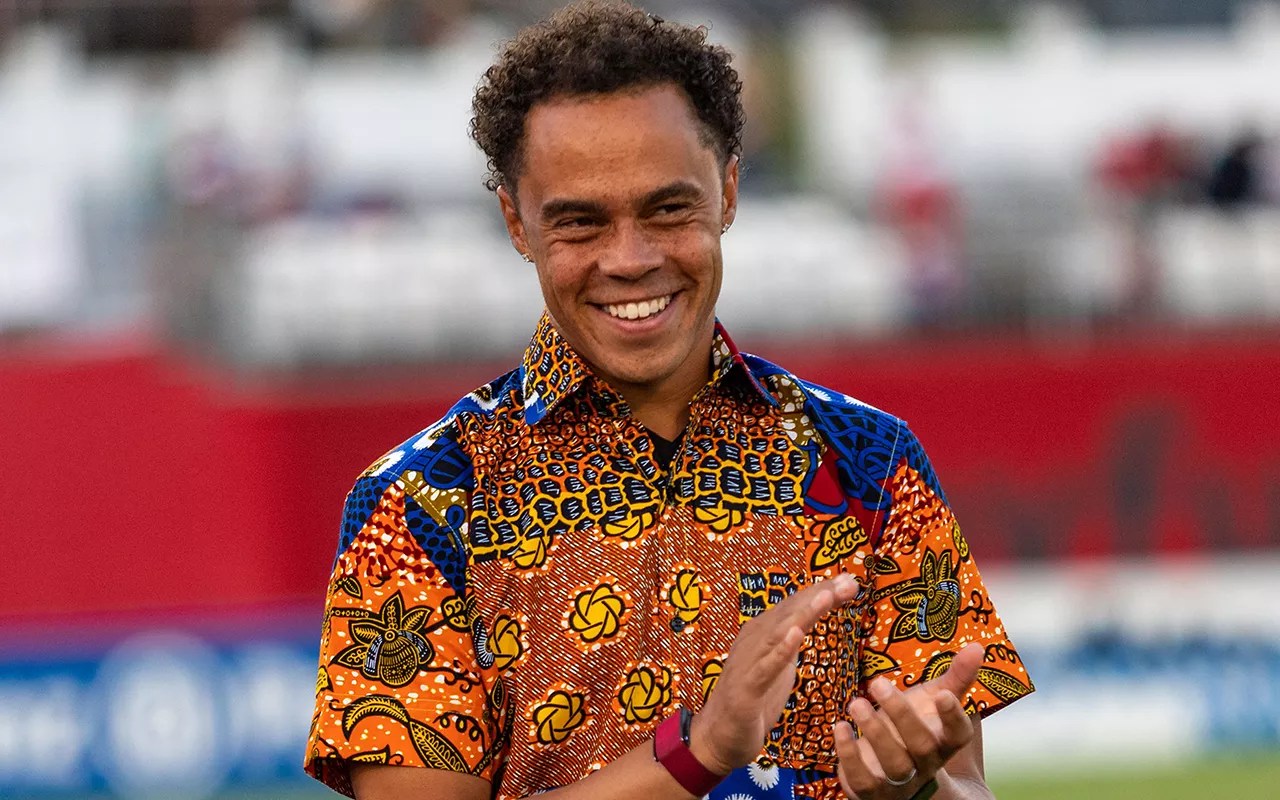
Jessica Stone Hendricks

Audio By Carbonatix
Who’s your number-one friend draft pick? Mine’s David Bulow. I don’t even have to think about it. There are friends who I see more, friends that I’m closer to, but when picking a friend to build a franchise around? I’m going with Dave. Every time.
I was asking my parents the other day how he and I met, and none of us could recall. Kindergarten? Preschool? My first concrete memories of Dave are from rec soccer. City Park League. Every one of my friends was on my team except for Dave. My five-year-old brain couldn’t handle that. How could someone who was my friend be on another team? Then he would light us up and the confusion was compounded. Lessons piled up on those overcast Saturday mornings: The world doesn’t revolve around you. Kids are free to play for whatever team they want to. Dave is better at soccer than everyone.
I didn’t go to elementary school in my neighborhood. My parents shipped me off to a private school from fourth grade through ninth. But when I was finishing my final year there, my neighborhood public high school, East High, went to the state championship in soccer. And as I would be attending East the following year and had designs on playing soccer, I went to the game with a few other curious kids from my private school. We filed into the game, sheepish around our public-school counterparts, our breath visible beneath the stadium lights.
Bulow was sitting on the bench, the only freshman on varsity. He looked tiny compared to the rest of the team, a stick-thin fourteen-year-old juxtaposed against eighteen-year-old men. But he was faster than any of them. That became immediately clear late in the game when they subbed him in and he loped across around the field like a gazelle, a fountain of energy. East beat Regis Jesuit High School that night, 2-1. State champs.
After the game, walking the warning track back to a friend’s car, we passed by Dave in a relatively quiet moment, given the frenzy of celebration exploding all around us. I called out to him, and he ran over and gave me a hug. He was buzzing from the victory; he asked me if I’d be going to East next year. I told him I would; he said that he’d see me on the pitch.
We did meet up on the field. I moved over to East and made the squad, and Bulow and I got to play together for three magical years. Finally playing on the same team brought us closer than we had ever been. We learned that our phone numbers were a mere digit apart. Mine was 333-9434. His was 333-9534. We couldn’t believe that. It made us feel like we were linked somehow, neighbors on the Mountain Bell grid. Connected.
Of course The Simpsons made us brothers. We were both partial to Ralph Wiggum so naturally, “I Love Lisa,” from season four, was a favorite. I can still hear David doing Ralph’s voice upon receiving Lisa’s obligatory valentine.
“It says you choo-choo-choose me!” Ralph says, giddy. “And there’s a picture of a train!”
The poor fuck.
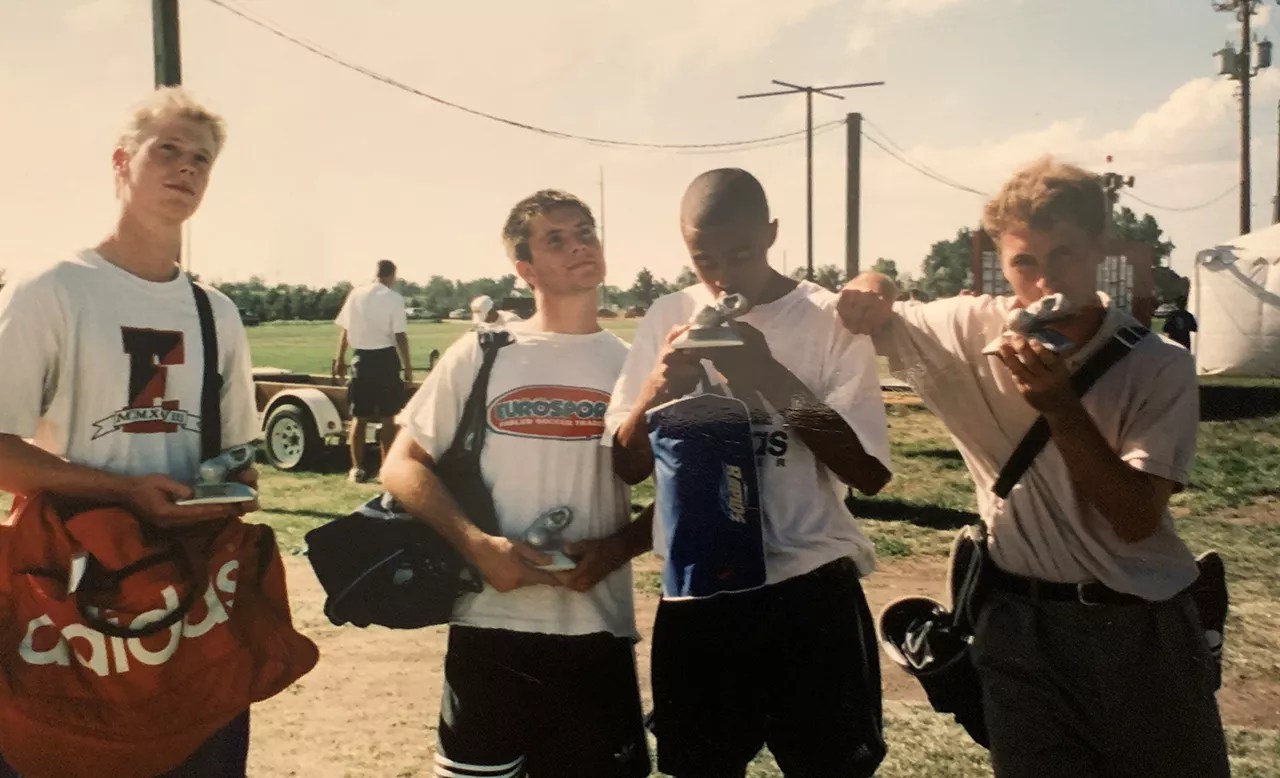
Teammates at East High School, where David Bulow (second from right) was Head Boy.
Adam Cayton-Holland
Bulow was elected Head Boy our senior year, one of those antiquated rah-rah holdover positions that conjures British boarding schools but really just meant that he did the morning announcements. And after the tedious doldrums of daily high school business, Dave would wind things down with the Bulow Joke of the Day, a deliberately awful piece of Laffy Taffy punnery that he would ham into the microphone, absolutely losing his shit at his own punchline. Then he would see how long he could fake laugh. Every morning. At 7:40 a.m.
He told me once his goal was to waste as much class time as he could for his fellow students. He was thoughtful like that. That’s why we made him Head Boy. His laughter would subside after his initial post-joke volley, then it would come roaring back; he’d pound on the desk and repeat the punchline in hysterical disbelief, like, can you believe how absolutely undeniably funny that was?! There were days when the principal had to wrench the microphone away. It was glorious.
I wasn’t ready for crowds yet, so I kept my musings to print. I wrote a humor column in the school paper. Every month, when it hit the stands, I would find Bulow in the hallway and he would indulge my insecurity. He’d let me know what jokes he enjoyed, literally pointing to the line with his finger.
How vulnerable. How beautiful. Two adolescent boys, two friends, one encouraging the other’s fledgling creativity, rooting for him, assuring him, coaching.
I recently found Dave’s yearbook note to me from our senior year, 1998:
“So anyway I says to Mabel, I says… [Simpsons reference]. We’re finally done with high school and I can’t be more relieved. I mean I’m getting a little sick of waking up so damn early to do absolutely nothing. There were some fun things though, like the football. You have to admit, we were the best looking and most talented pair on the pitch. It must have been our outstanding training in Indiana. Oh yeah, at the risk of hurting your feelings, you were off-sides on your, “World Cup winning goal.” HA HA. It has been a pleasure going to school with you, and I’m looking forward to breaking your legs when Bowdoin beats the crap out of Wesleyan next year. Good luck with your future. – Bulow.”
“There were some fun things though, like the football. You have to admit, we were the best looking and most talented pair on the pitch.”
We’d attended a University of Indiana soccer camp the previous summer, to tune up for our senior year. When we checked in, they had us backwards in the system. They thought I was David and that he was Adam. So we just went with it. No one at the camp knew us. Why not run with the gag? The entire week I pretended I was David Bulow. So really, if you think about it, it was actually him who was off-sides on that World Cup winning goal.
Bulow did make the soccer team at Bowdoin. He eventually became the captain and went on to set the school’s single-season scoring record. During summers he began playing for the Cape Cop Crusaders, a semi-professional team in the second division of the United Soccer League. I didn’t make the Wesleyan squad; I flew out early for tryouts a few weeks before my freshman year but didn’t make the cut.
Depression. Alcohol. Drugs. Vandalism. Of course, Bulow still tried to break my legs.
One afternoon, I was walking across Foss Hill, the sprawling green in the center of the Wesleyan campus where they set up the football field in fall, the baseball field in spring. If I noticed the two baseball teams warming up for their game, I paid them no mind. Just part of the backdrop of my collegiate existence. I suppose I didn’t think anything of the player running toward me, either. I caught a blur of motion in my periphery but my lizard brain indicated nothing amiss. Just a guy warming up. Then suddenly I was flat on my ass, ruthlessly knocked to the ground. That quick: upright, prostrate, in under half a second. It was a perfect tackle, the baseball player’s head planted somewhere between my stomach and chest, his arms wrapped completely around my torso. I thrashed my way out of his clutches and started to fight back when I caught a glimpse of my would-be assassin and looked into the sparkling eyes of Dave. I didn’t even know he was playing baseball at Bowdoin, but I learned in that exact moment, emphatically.
I watched the game from the bleachers, chatted with Dave for a bit afterward, then waved at the team bus as it headed back up to Maine. Waved at my friend David Bulow.
We graduated. I bounced around trying to figure out my next move. I started freelancing for Westword and started doing standup at about the same time. I didn’t tell anyone I was doing it. I don’t know if I was ashamed or embarrassed or I just wanted to make sure I didn’t completely suck at it before I let anyone know. So I would go to dive bars at night like a thief, run jokes, watch all the other performers do their thing, then go home, no one in my circle the wiser. But after six months or so, it seemed to be working. It felt safe enough to tell someone. So I told Dave. He was in town and had reached out to get together. I told him to come to the Lion’s Lair at 10 p.m. that Monday. I showed up at the bar at 9:30; Dave was already there. I decided to try a bunch of new shit that night. George Bush had done something to piss me off, and I felt like the only way to take that asshole down a peg was to howl into a microphone in front of thirteen strangers in a Denver dive. And Bulow. Which I did, and promptly ate shit. I don’t know if I’ve ever seen Dave laugh that hard.
But after my set he offered constructive criticism, told me he could totally see me doing standup, that I was a natural up there. He coached.
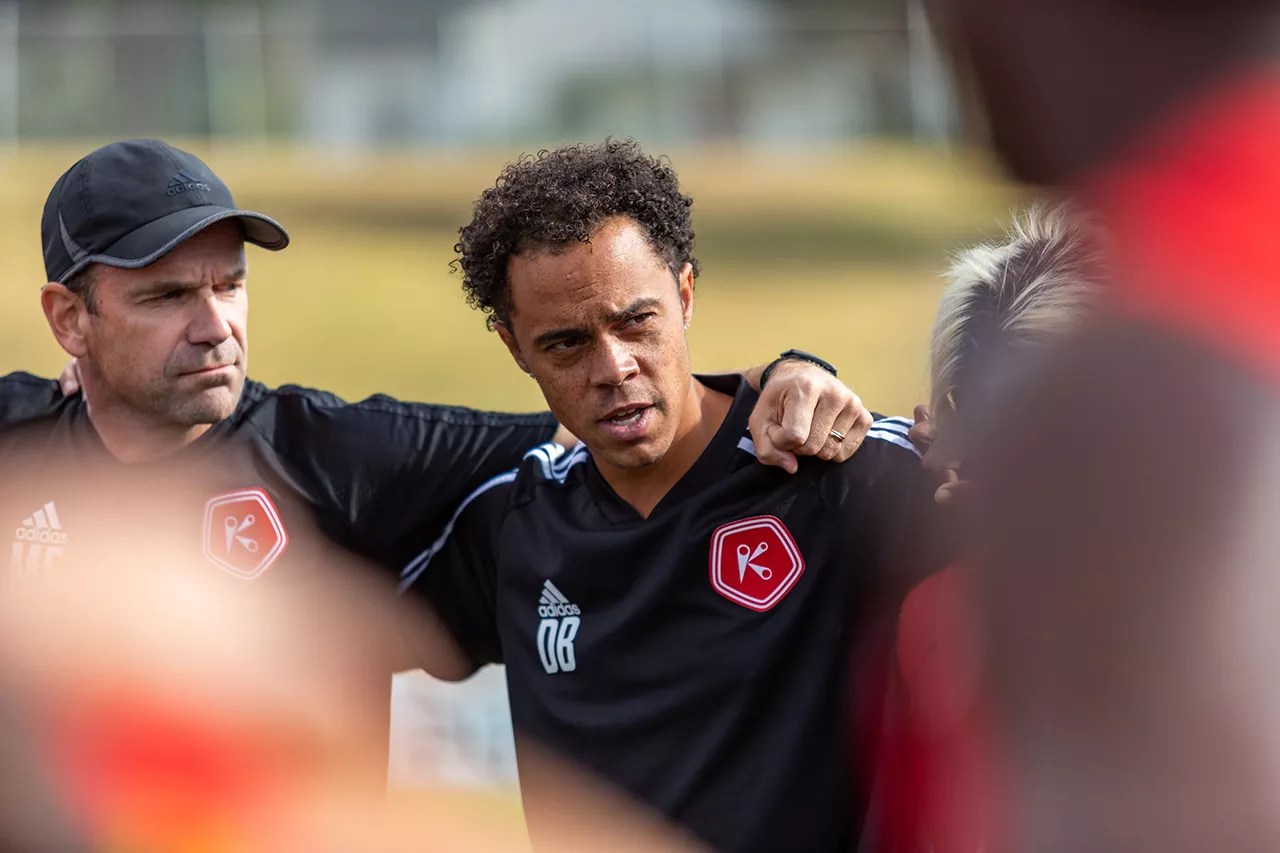
Dave Bulow carved out a professional soccer career, playing for the Richmond Kickers.
Jessica Stone Hendricks
Meanwhile, David was carving out a professional soccer career for himself. He went back to the Cape Cod Crusaders, won three national championships in a row with them. In one of those seasons he scored 21 goals in 18 games. I mean, that’s just ridiculous. After that, he was picked up by Limavady United, in Northern Ireland. He had a cup of coffee in the Colorado Rapids farm system, then bounced back to Northern Ireland to play for the Dungannon Swifts. While there, he got an offer to play with FC Dallas in the MLS. He passed. I found an article where he explained his decision.
“Maybe it was a mistake,” Bulow said. “But I wasn’t ready to move to Texas, live in a hotel and make a thousand dollars a month.”
His career was so fascinating to me. Dave would send me links to articles about his accomplishments, and I tried to follow him online as best as I could. It tickled me to no end how far he was going with soccer. I felt paternalistically proud. When the guy you grew up playing soccer with becomes a pro, your meager abilities rise like a revisionist tide. It made me feel cool by association. Dave was similarly tickled by my career. He followed me as I started headlining clubs, getting TV spots, my cups of coffee with various comedy farm systems.
Growing up, we had always bonded over two things: soccer and humor. And in our professional lives, we each chose to pursue one of them. I think we were amazed to see how far the other could run with it.
Dave started playing for the Richmond Kickers, the oldest soccer club in the U.S. My mom grew up in Richmond; my aunt and uncle and cousins still live there. So we started scheduling our trips to Richmond to coincide with Kickers games. I think Dave really found his soccer home with the Kickers. I’ll never forget the first time I saw him take the pitch at City Field, down the street from my cousin Molly’s house. He was a starter. He wore #10, the most vaunted of all soccer numbers. He was their star, one of the top goal-scorers in the league. I sat in the bleachers with the comped tickets he had left at the gate for me and my family; I looked around the stadium and shook my head in disbelief at all the people wearing David Bulow jerseys. There was a sea of them. He was a fan favorite. After the game, he signed autographs for anyone who wanted one. He talked to each of the kids that approached him, rubbed their heads and joked with them, gave them his time. He looked so professional, so diplomatic. My friend David Bulow, signing his own goddamn jersey.
“Maybe it was a mistake. But I wasn’t ready to move to Texas, live in a hotel and make a thousand dollars a month.”
On another trip to Richmond – Dave and I in our thirties by then, him aging as a player but still putting up impressive numbers – we met at a sushi restaurant where my cousin worked. We sat at a high-top, and Dave shared with me how he had finally met his birth mother.
I didn’t even know he was trying to find her. That wasn’t a side of himself we ever really spoke about. I knew he was adopted. His parents were white, he was Black. It was hardly a secret. But David was always so confident in who he was, so carefree, I suppose I just thought it wasn’t something he wanted to dig into. He was David Bulow, the spark plug, the man with the million-watt smile and the two diamond earrings; he was charming and hilarious and the best soccer player any of us knew. What more did he need to know?
But of course there was so much more Dave wanted to know. So he set out to find his mother, and their meeting went really well; he was excited about having a burgeoning relationship with her. He was so happy that it hadn’t been a disaster, that a piece of his puzzle was filled. Dave had this brilliant batch of freckles dotting his skin.
They stretched across the bridge of his nose, from the edge of one cheek to the other. They made him seem childlike, even as our hairlines receded and we aged into men. The fans in Northern Ireland were in love with them.
A face without freckles is like a night without stars.
They were kind of his signature characteristic, but I knew he was self-conscious about them. More than once I’d heard him described as the Black kid with freckles.
“Adam,” he told me, tears welling in his eyes. “She had my exact face.”
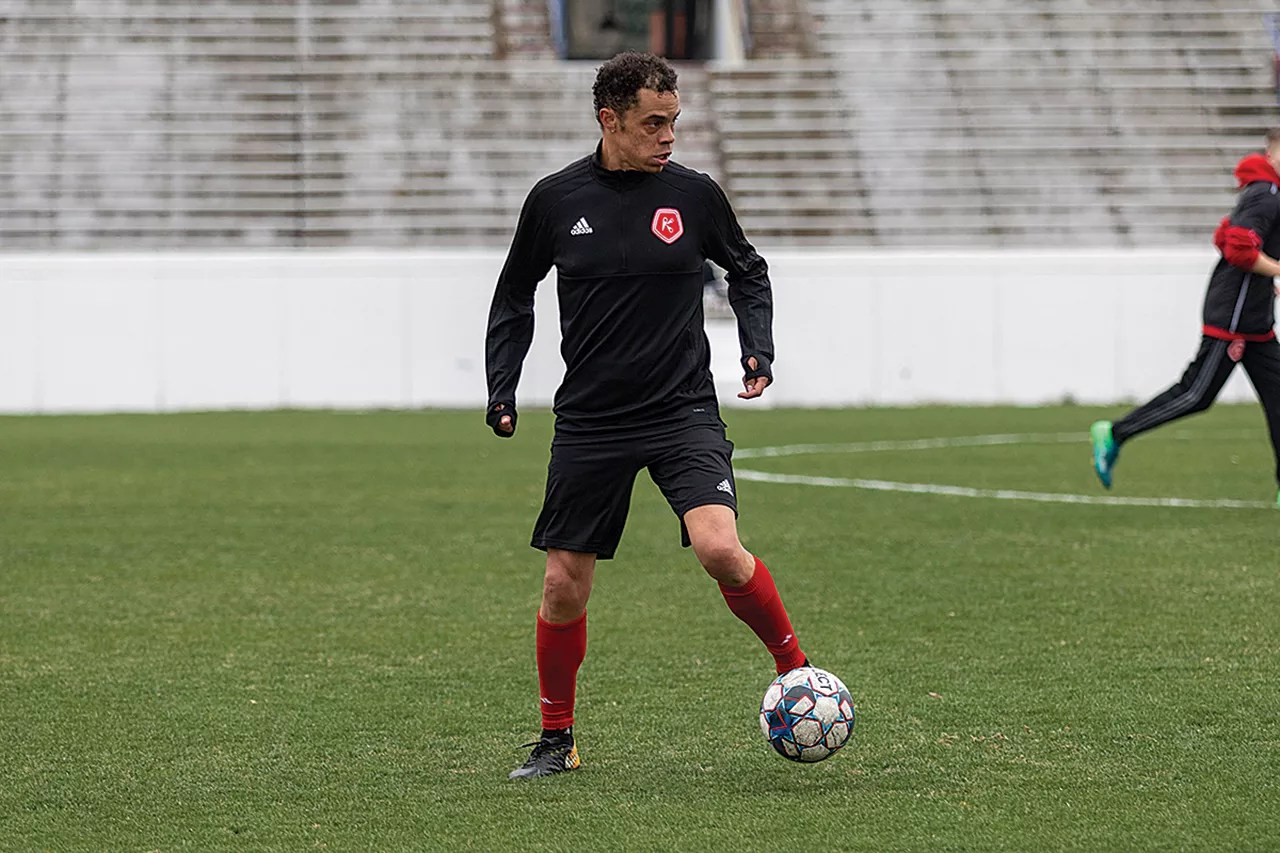
David Bulow on the field as a Richmond Kicker.
Jessica Stone Hendricks
Have you figured out why I’m writing this? Pouring my heart out about my friend Dave? My number-one draft pick? My high school’s Head Boy, the best we had to offer? Do you already know this isn’t going to end well?
No one writes something like this that ends well. We don’t sit down and memorialize our friends when they’re alive. God, I wish we did. I wish we penned bittersweet, heartfelt screeds about all the people we love in our lives before they’re gone, just to let them know how much they mean to us. To let ourselves know. Eulogies for the living. That way you wouldn’t have to read about Dave in the past tense. That way you could track him down in Richmond or Cape Cod or Derry or wherever he was in the world and go up to him and tell him you’re a fan, tell him that you read the piece that I wrote about him and you just had to see for yourself. Or fuck my words, you could just tell him you got wind of him because of all he was accomplishing, his sterling reputation, the joy for the Beautiful Game he exuded everywhere he went. Then Dave would shake your hand and smile with his whole freckled face, and in that moment you would feel like that smile was for you and you alone. And you would be right.
Dave became head coach of the Kickers. He was smart, strategic. He had been coaching for the youth teams for years, snagged a position as an assistant coach late in his career, then catapulted that experience to the head coaching position. It was his turn at the helm. He dressed like all those impossibly stylish Euro soccer coaches for games, caps and tucked-in dress shirts. Sometimes he wore trainers. But he always looked sharp out there, pacing the sideline, barking instructions at his players who loved him because he was one of them. In his post-game interviews, he spoke with a bit of an Irish brogue, picked up from his time abroad. His was a nimble soccer mind. The team had some great moments with Bulow in charge. They made SportsCenter one night, early in his tenure, for this ridiculous trick free kick that most squads would never even attempt. I watched the clip on the internet; I could picture the exact look of satisfaction that spread across Bulow’s face when that shit somehow actually worked. The same smile I saw when he would pull off a bicycle kick or bend it with the outside of his foot when we would head up to East on the weekends to shoot around.
We both got married. I was in his wedding party. He gave me a watch. David met my girlfriend that night, the woman who would become my wife. He wrapped her in a hug and said, “Welcome to the family.” She never forgot that. There was never any cynicism or masks with him. He was an open book. It’s funny our senses of humor bonded us because I’ve always had a more caustic approach, but it always seemed to me that David came at it from a purer angle; I think he responded to the absolute joy of the endeavor, the pure laughter. I think that was the way David loved.
I toasted him after the ceremony that night, in a tent in a field. I shared some of the stories that I’ve shared here. I wrapped it up with a simple truth that everyone in the room already knew, no one better than his bride, Nellie: Life is just better with David Bulow in it.
We had started chatting more frequently this past year, the pandemic reminding us of what’s important, who we love. I remember our last call. He told me that he’d been let go from the Kickers and was searching around for new jobs. Nellie, a nurse, was breadwinning at the time. He said they had “baller health insurance” because of her job, bragged that the entire birth for his little girl would cost them around $100. After that, they were going to figure out their next move. He had friends coaching at the Columbus Crew. He was fairly confident he could land a job there. If not there, then maybe the franchise in Sacramento. He seemed excited about his prospects.
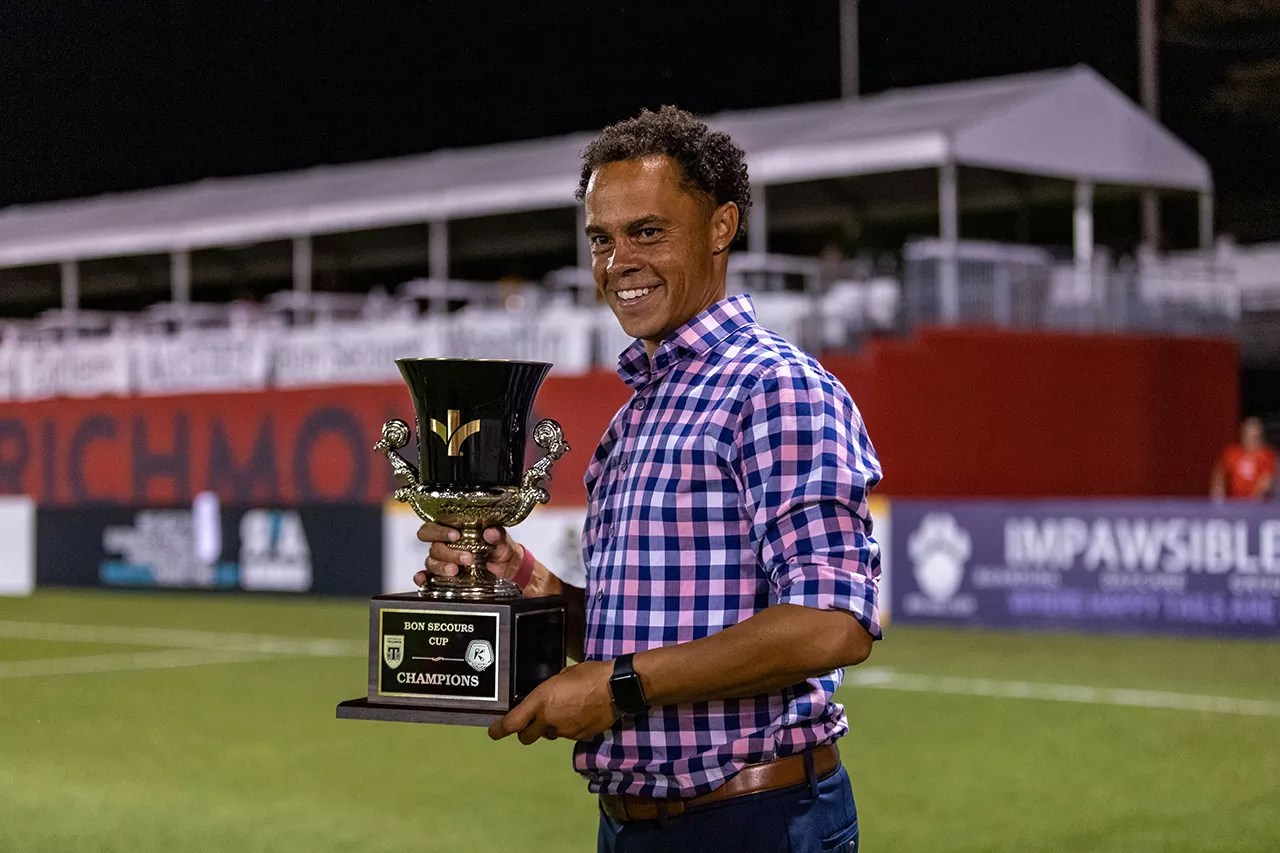
Dave Bulow became head coach of the Richmond Kickers.
Jessica Stone Hendricks
He asked me how I was enjoying fatherhood. At the time, he had two boys and a little girl on the way, and he wanted to talk about how fun it is being a dad. What I remember most about that call was the omnipresence of his boys in the background. They were playing in the backyard as we chatted, and our entire conversation was punctuated by their shrieks and howls and chaos. They interrupted every other sentence. With anyone else, you’d be annoyed. Like, call me when you have a minute to chat, man. But I loved it. It was this intimate window into Dave’s approach to fatherhood. And it was just him relentlessly fucking with his kids. A joyous, absurd back-and-forth. They would run up to him with some giddy query, some issue to be dealt with by their goofy dad, and he’d adopt this playful tone of utter incomprehension.
In what world do you even begin to think that’s something I’m going to help you with right now? I am on the phone with Adam. Hold on, hold on, hold on, this is a straight-up serious question: Are the two of you bananas? Because if you’re bananas, I’ll call Mom and tell her, and when she gets home we’re going to go bake the two of you into some banana bread.
The boys would stop and assess their father’s latest comment, realize he was still spewing the same silly nonsense as always, then explode into peals of laughter and tear ass back across the yard. I recognized the approach immediately as the same one I take with my son. The same one that always gets a laugh, or at the very least, a “Dada so goofy” as he shakes his head, amused. If you’re not being goofy with your kiddos, why did you even get into this game?
His daughter was born about a month later.
Hanging out with some friends in a backyard earlier this year, one of them asked me what was up with my friend Dave. She remembered him fondly from my wedding. I filled her in about his growing family, his eagerness for the next chapter in his coaching career, and we all agreed that he was an exceptional human. Simple as that. We just appreciated him in the moment.
I texted him the next day, even though he was a caller, not a texter.
Was hanging with some friends last night and we were all talking about how great you are. Hope you’re good, amigo.
He responded two weeks later with a TikTok video. I’m very into bird-watching because I’m white and listen to public radio, so Dave sent me a dumb video of this cartoonist who had gotten into birding during the pandemic. With binoculars around his neck, the illustrator explains that he’s using the opportunity to break out of cartooning and draw really detailed depictions of all the birds he’s seeing. He shows some of his work. Every bird has a huge ass. Just a wiggly, juicy, cartoon human butt on bird after bird after bird.
I wrote Dave back, “BIRD BUTZZZZ!”
“BIRD BUTZZZZ!!!” his reply.
April 24, 2021, 12:14 p.m. Our last exchange. So stupid. So perfect.
Bird butts.
Can you feel it coming? The denouement?
I wish I didn’t have to write this part, but I do. It’s what I did after I lost my sister to suicide, too. I sat down and I wrote and I wrote, and I don’t even know why. It’s not some grandiose writer flex, like you might think.
This is just what I do, man. I bleed onto the page.
Maybe it helps me organize my thoughts. Maybe I feel like if there’s some record of these people I treasure, then they won’t be lost to time, to the furious passing of day after relentless day. Maybe this is my way of feeling every emotion I have, as hard as I can. Maybe I have to inhabit these feelings, have to make these catalogues of my devastation before I can truly move on. Even though I never do. I just get further and further away from the point of impact. But I’m forever impacted.
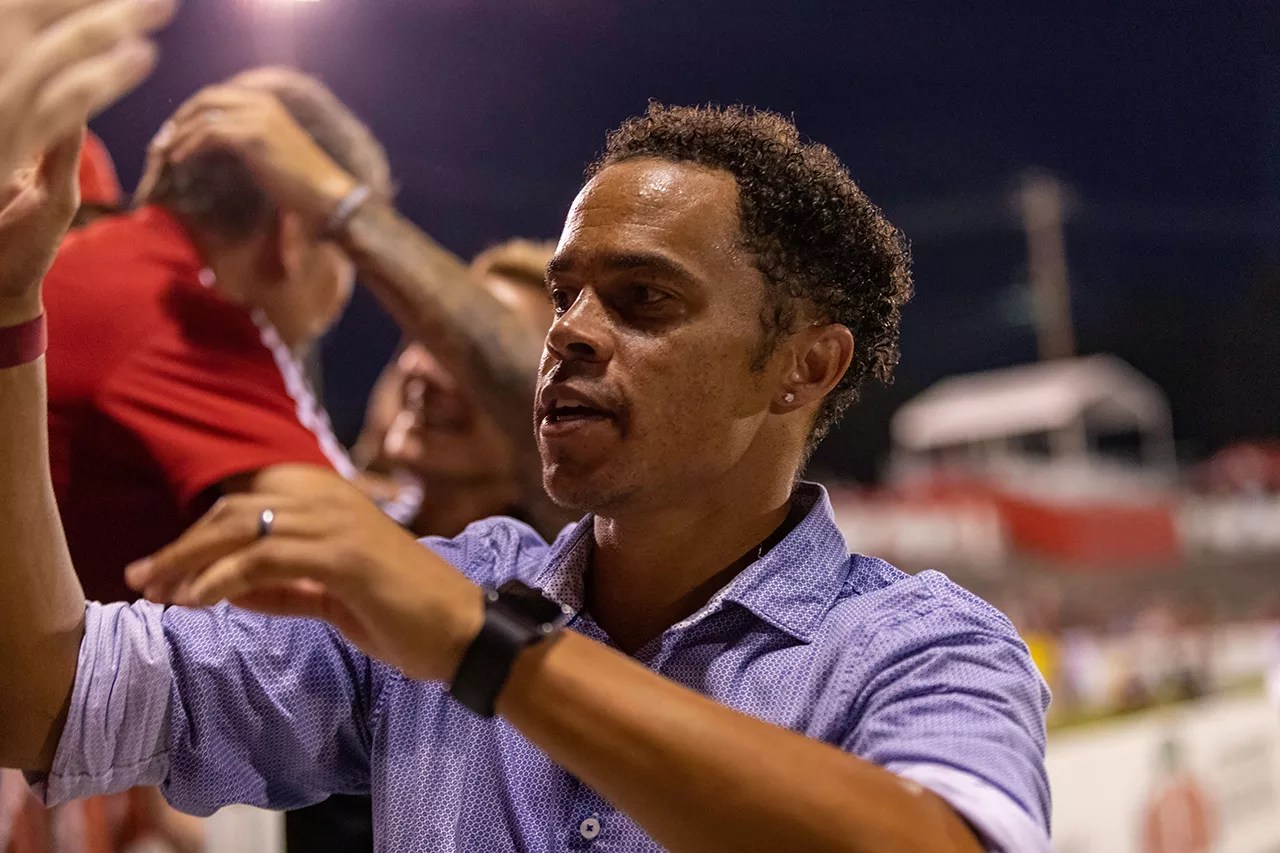
Jessica Stone Hendricks
His wife, Nellie, called me the day after our silly bird butts exchange, not even twelve hours later. Dave had suffered a massive stroke. It caused him to fall down fourteen stairs at his house. Fourteen. He hit his head; it fucked up everything even worse. He was in the ICU. Intubated. In a deep coma. These awful words, one after another. It was a wait-and-see game, she said. She was devastated.
I didn’t know how to make sense of of it; it was like seeing Dave in another team’s jersey in City Park all those years ago. It didn’t compute. Dave was 41, an athlete, a lion, a force. How did he have a fucking tube down his throat? And brain bleeding. And trauma. These awful words.
I spoke my platitudes, told her if there was anything we could do to help here in Denver, we would do it; I offered up my cousins for child care in Richmond. But her family was already flying out. There was nothing she needed from me now. We all just had to wait.
I went on a bike ride through City Park that night, the park where Dave and I first played soccer. And baseball. And a game we invented called Monkey-Ball that we played with a weighted Brazilian futsal ball, on the handball courts, back behind the Denver Zoo’s Primate Panorama. I was looking for a sign.
It was an uncharacteristically foggy evening. A haze hung over the park. Between Ferril Lake and the little lake alongside it, a bald eagle perched on a lamppost. A crowd of people stood beneath it; I stopped to watch as well. A cormorant flew by and the eagle took off after it, over the larger of the two lakes. It missed by inches. The cormorant hurried away and the eagle swooped low over the lake in petulant circles before climbing higher and disappearing beyond the trees.
A man fishing stood nearby, equally mesmerized.
“That’s got to be a good sign,” I said, hopefully.
“It’s definitely a sign of something,” he said.
I rode my bike behind the Denver Museum of Nature & Science, the picture-postcard view of the Mile High City. There’s a statue of a grizzly bear with its cub right there. In high school our coach used to make us run what she called “A Bear’s Nose.” We would head out the gate from our soccer field, across 17th Avenue, then through the park to the museum. When we got to the statue, we would climb up its base, then leap up to tap the bear on the nose, one after another. A Bear’s Nose. I got off my bike at the statue and jumped up to touch the grizzly’s snout. I thought it would bring David good luck. I thought if anyone could fight through this, it was him.
“Was hanging with some friends last night and we were all talking about how great you are. Hope you’re good, amigo.”
A week later, Nellie texted me that she had just met with the chief of neurosurgery and that the changes they were seeing in his brain didn’t bode well. She told me that she thought Dave was going to let us know he’d had enough soon, and that she was sure he would love to hear my voice. She put me on speakerphone, and I said goodbye to my friend Dave. I could hear the hum of medical machinery. I told him that he was one of the funniest people I’d ever met. I told him that I was dying to get his take on the recent European Super League fiasco. I told him that we had started my son, Malcolm, in a little two-year-old soccer program in City Park on Saturdays, and that it didn’t seem to be taking; he was more interested in the passing trucks. I needed Dave to assert some influence on this kid’s soccer career however he could.
And then I thanked him. I thanked him for being my friend and for bringing so much joy into my life. And I told him that I loved him.
Nellie and I cried, and I offered the crumbs of wisdom I could muster in the moment. That there will come a time when she’ll remember the joy instead of this hell. There will come a time when the awfulness of this ending won’t overshadow the gift of the time they had together. But I told her that time was way off. And that even when it does get better, it will never be right. It will never be fair. It will be just another cruel, nonsensical death blow that we silly humans have to endure for some reason, some reason that no one can convincingly explain, even after all these millennia of philosophy and religion and existentialism, nothing, so we just have to throw up our useless hands and try to laugh at it all, because if not, we’re going to cry our goddamn eyes out.
Bird butts.
We discussed a few matters I could try to help her with in Denver. I promised to do everything I could. She told me that they recommend waiting three weeks, the typical maximum amount of time a brain needs to come back down from swelling. Nellie said if there wasn’t any improvement by then she was going to pull the plug. She didn’t want him to live like that. With no brain function, connected to a thousand machines. She knew he wouldn’t want to. I told her that I loved her, and David, and their three kiddos, and that I would be there for them, always.
Five days later, after a handful of thinking of you guys and heart emoticons, Nellie texted me that Dave had passed in the morning.
Thank you for being a great friend all these years, she wrote.
I’m trying my hardest to remember all those years. Trying so hard not to dwell in this devastated place. I know David wouldn’t want me here. He didn’t like me sad; all we did was laugh together. Right now, he’d pull me in for a hug and say, “There, there, lad, give us a kiss,” then he’d fake head-butt me like a hooligan in the supporter section. And I’d laugh in spite of myself. Just like I did every time we went to a bar and he gave the bouncer at the door his Stedman Elementary School ID, third-grade David Bulow smiling for the cameras. It got a laugh every single time.
I’m trying. But anyone who has lost someone knows how hard it is to keep laughing. How it takes so many years of mourning before the tragic end doesn’t eclipse the glorious story. And I’m not there yet. I wish David Bulow was alive right now. I wish he could raise his three children. I wish they could get to know their goofy dada more. I wish his wife could sleep in the same bed with him tonight. Tragedy reminds us all of the preciousness of life blah, blah, blah. I’m over it. I wish life didn’t mute the immutable. I wish you couldn’t defile the sacrosanct. I wish we all didn’t know loss like this. I wish my friend was still here. I wish I could hug David Bulow and laugh with him again and remember all those times we made magic together.
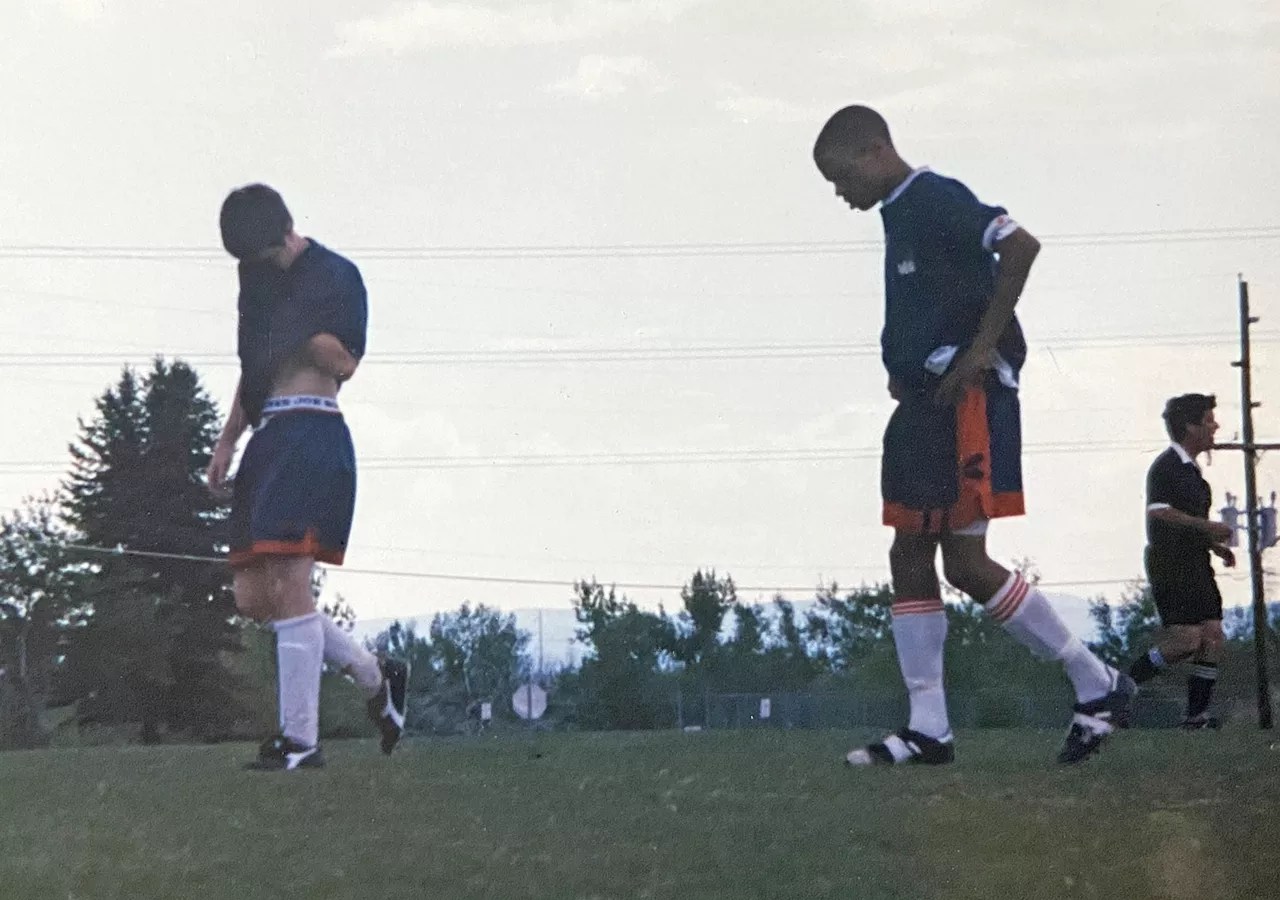
Adam Cayton-Holland and Dave Bulow on the soccer field in high school.
Adam Cayton-Holland
The best goal I ever scored wasn’t with our high school team. It was with our club team, Club Denver. Spring 1998.
David had taught himself how to do one of those long throw-ins. A handful of kids our age could do the flip long throw-in, a kind of trick move where you essentially do a forward cartwheel with the ball in your hands, then whip that sucker as far as you can. But that style was always erratic. Half the kids ate shit even attempting it, or stepped their foot over the out-of-bounds line, back onto the field. And it was a telegraphed move. It required a big runway. You saw someone backing up to do one of those flip throw-ins, and you knew what was coming. You could defend it. David’s approach was more refined. He had been honing it for years. Standing basically still, he could throw the ball twenty, thirty yards off of strength and athleticism alone. You would see the pros do it on TV. But no one at our youth level was even closing to pulling it off. Except for David.
Of course once he executed that long throw-in in a game, the secret was out. After that, the other team knew what was coming, and they would defend accordingly. No more sneak attacks. So you only really got one good shot a game.
The ball went out of bounds on the sideline – around midfield, in my memory. Dave went to take the throw-in. I was on the complete opposite side of the field from David, hanging back on our own defensive end from the previous play. As far as the opposing team knew, I was about as far away from the action as one could be. But I caught the whites of David’s eyes. He gestured with his chin toward the opposing goal.
I started sprinting diagonally, as fast as I could, blazing a path toward the center of the field, then beyond, into offensive territory. Dave hurled the ball with everything he had toward me, an absolute perfect lob. As I sprinted past the stunned defenders the ball struck the dead center of my chest; I controlled it to the ground in front of me. It bounced once and rose back into the air; mid-stride, I gave that ball everything I had with my left foot. The goalie dove to his left, his far side, but it was too late. The ball shot into the side netting of the goal.
I never stopped running. I turned back around in a fluid semi-circle and kept sprinting, in the opposite direction now, looking for David. He was already sprinting toward me, arms out like an airplane. Neither one of us could believe we had just pulled that off. We had one narrow window to even attempt something so brazen, and we nailed it. It was glorious. David wrapped me in his arms, I wrapped him in mine, and as we walked back for the kick-off, he rubbed the back of my head.
A GoFundMe page has been set up to support David Bulow’s family; find more information here.